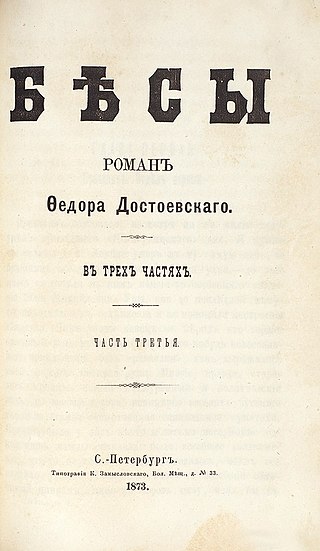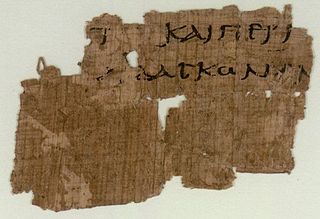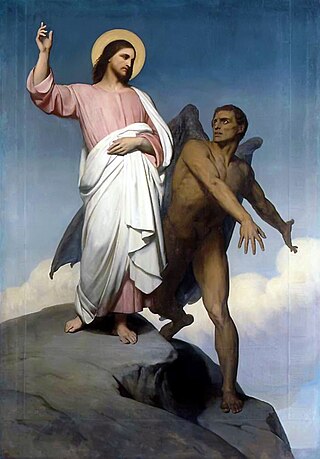
Fyodor Mikhailovich Dostoevsky, sometimes transliterated as Dostoyevsky, was a Russian novelist, short story writer, essayist and journalist. Numerous literary critics regard him as one of the greatest novelists in all of world literature, as many of his works are considered highly influential masterpieces. Dostoevsky's literary works explore the human condition in the troubled political, social, and spiritual atmospheres of 19th-century Russia, and engage with a variety of philosophical and religious themes. His most acclaimed novels include Crime and Punishment (1866), The Idiot (1869), Demons (1872), and The Brothers Karamazov (1880). His 1864 novella Notes from Underground is considered to be one of the first works of existentialist literature.

Tikhon of Zadonsk was an 18th-century Russian Orthodox bishop and spiritual writer whom the Eastern Orthodox Church glorified (canonized) as a saint in 1861.

The Brothers Karamazov, also translated as The Karamazov Brothers, is the last novel by Russian author Fyodor Dostoevsky. Dostoevsky spent nearly two years writing The Brothers Karamazov, which was published as a serial in The Russian Messenger from January 1879 to November 1880. Dostoevsky died less than four months after its publication. It has been acclaimed as one of the supreme achievements in world literature.

Demons is a novel by Fyodor Dostoevsky, first published in the journal The Russian Messenger in 1871–72. It is considered one of the four masterworks written by Dostoevsky after his return from Siberian exile, along with Crime and Punishment (1866), The Idiot (1869), and The Brothers Karamazov (1880). Demons is a social and political satire, a psychological drama, and large-scale tragedy. Joyce Carol Oates has described it as "Dostoevsky's most confused and violent novel, and his most satisfactorily 'tragic' work." According to Ronald Hingley, it is Dostoevsky's "greatest onslaught on Nihilism", and "one of humanity's most impressive achievements—perhaps even its supreme achievement—in the art of prose fiction." Many great writers including Joseph Brodsky, Marek Hłasko, Sergei Dovlatov have lauded it as the greatest novel ever written.
An inquisitor was an official in an Inquisition led by the Roman Catholic Church.

Matthew 4 is the fourth chapter of the Gospel of Matthew in the New Testament of Christian Bible. Many translations of the gospel and biblical commentaries separate the first section of chapter 4 from the remaining sections, which deal with Jesus' first public preaching and the gathering of his first disciples.

Matthew 4:3 is the third verse of the fourth chapter of the Gospel of Matthew in the New Testament. This verse opens the section in Matthew dealing with the temptation of Christ by Satan. Jesus has been fasting for forty days and forty nights, and in this verse the devil gives Christ his first temptation by encouraging him to use his powers to get food.

Matthew 4:6 is the sixth verse of the fourth chapter of the Gospel of Matthew in the New Testament. Jesus has just rebuffed "the tempter's" first temptation; in this verse, the devil presents Jesus with a second temptation while they are standing on the pinnacle of the temple in the "holy city" (Jerusalem).

Matthew 4:9 is the ninth verse of the fourth chapter of the Gospel of Matthew in the New Testament. It is part of the Temptation of Christ narrative. Jesus has rebuffed two earlier temptations by Satan. In this verse, Satan offers control of the world to Jesus if he agrees to worship him.

Matthew 4:11 is the eleventh verse of the fourth chapter of the Gospel of Matthew in the New Testament. Jesus has just rebuffed Satan's third temptation and ordered him away. In this last verse of the temptation scene, the devil departs and Jesus is serviced by angels.

The temptation of Christ is a biblical narrative detailed in the gospels of Matthew, Mark, and Luke. After being baptized by John the Baptist, Jesus was tempted by the devil after 40 days and nights of fasting in the Judaean Desert. At the time, Satan came to Jesus and tried to tempt him. Jesus having refused each temptation, Satan then departed and Jesus returned to Galilee to begin his ministry. During this entire time of spiritual battle, Jesus was fasting.

Alexei Fyodorovich Karamazov, usually referred to simply as Alyosha, is the protagonist in the 1880 novel The Brothers Karamazov by Fyodor Dostoevsky. He is the youngest of the Karamazov brothers, being nineteen years old at the start of the novel. The preface and the opening chapter proclaim him as the hero. Dostoevsky intended to write a sequel, which would detail the rest of Alyosha's life, but died shortly after the publication of The Brothers Karamazov.

Christus Victor is a book by Gustaf Aulén published in English in 1931, presenting a study of theories of atonement in Christianity. The original Swedish title is Den kristna försoningstanken published in 1930. Aulén reinterpreted the classic ransom theory of atonement, which says that Christ's death is a ransom to the powers of evil, which had held humankind in their dominion. It is a model of the atonement that is dated to the Church Fathers, and it was the dominant theory of atonement for a thousand years, until Anselm of Canterbury supplanted it in the West with his satisfaction theory of atonement.
In literature, polyphony is a feature of narrative, which includes a diversity of simultaneous points of view and voices. Caryl Emerson describes it as "a decentered authorial stance that grants validity to all voices". The concept was introduced by Mikhail Bakhtin, using a metaphor based on the musical term polyphony.

The Brothers Karamazov is a 1969 Soviet film directed by Kirill Lavrov, Ivan Pyryev and Mikhail Ulyanov. It is based on the 1880 novel by Fyodor Dostoevsky. It was nominated for the Academy Award for Best Foreign Language Film. It was also entered into the 6th Moscow International Film Festival, winning Pyryev a Special Prize.

Anthropocentric is the fifth studio album by German post-metal band The Ocean. It is the second album in a two-album series, following Heliocentric. Anthropocentric continues the critique of Christianity as in its companion album Heliocentric and is the band's first album to feature songwriting credits from other members aside from guitarist Robin Staps. The album was released in North America on 9 November 2010.

The Temptations of Christ is a fresco by the Italian Renaissance painter Sandro Botticelli, executed in 1480–1482 and located in the Sistine Chapel, Rome.

The themes in the writings of Russian writer Fyodor Dostoevsky, which consist of novels, novellas, short stories, essays, epistolary novels, poetry, spy fiction and suspense, include suicide, poverty, human manipulation, and morality. Dostoevsky was deeply Eastern Orthodox and religious themes are found throughout his works, especially in those written after his release from prison in 1854. His early works emphasised realism and naturalism, as well as social issues such as the differences between the poor and the rich. Elements of gothic fiction, romanticism, and satire can be found in his writings. Dostoyevsky was "an explorer of ideas", greatly affected by the sociopolitical events which occurred during his lifetime. After his release from prison his writing style moved away from what Apollon Grigoryev called the "sentimental naturalism" of his earlier works and became more concerned with the dramatization of psychological and philosophical themes.
Problems of Dostoevsky's Poetics is a book by the 20th century Russian philosopher and literary theorist Mikhail Bakhtin. It was originally published in 1929 in Leningrad under the title Problems of Dostoevsky's Creative Art but was re-published with significant additions under the new title in 1963 in Moscow. The book was first translated into English in 1973 by R. William Rotsel but this version is now out of print. Caryl Emerson's 1984 translation is the version now used for academic discussion in English.
Ivan Fyodorovich Karamazov is a fictional character from the 1880 novel The Brothers Karamazov by Fyodor Dostoevsky. Ivan is 24 years old at the start of the novel; he is the elder brother of Alyosha Karamazov, younger brother of Dmitri Karamazov, and the son of Fyodor Karamazov. His relationships with his brothers, his father, and Katerina Ivanovna are hugely important to the novel's plot.















